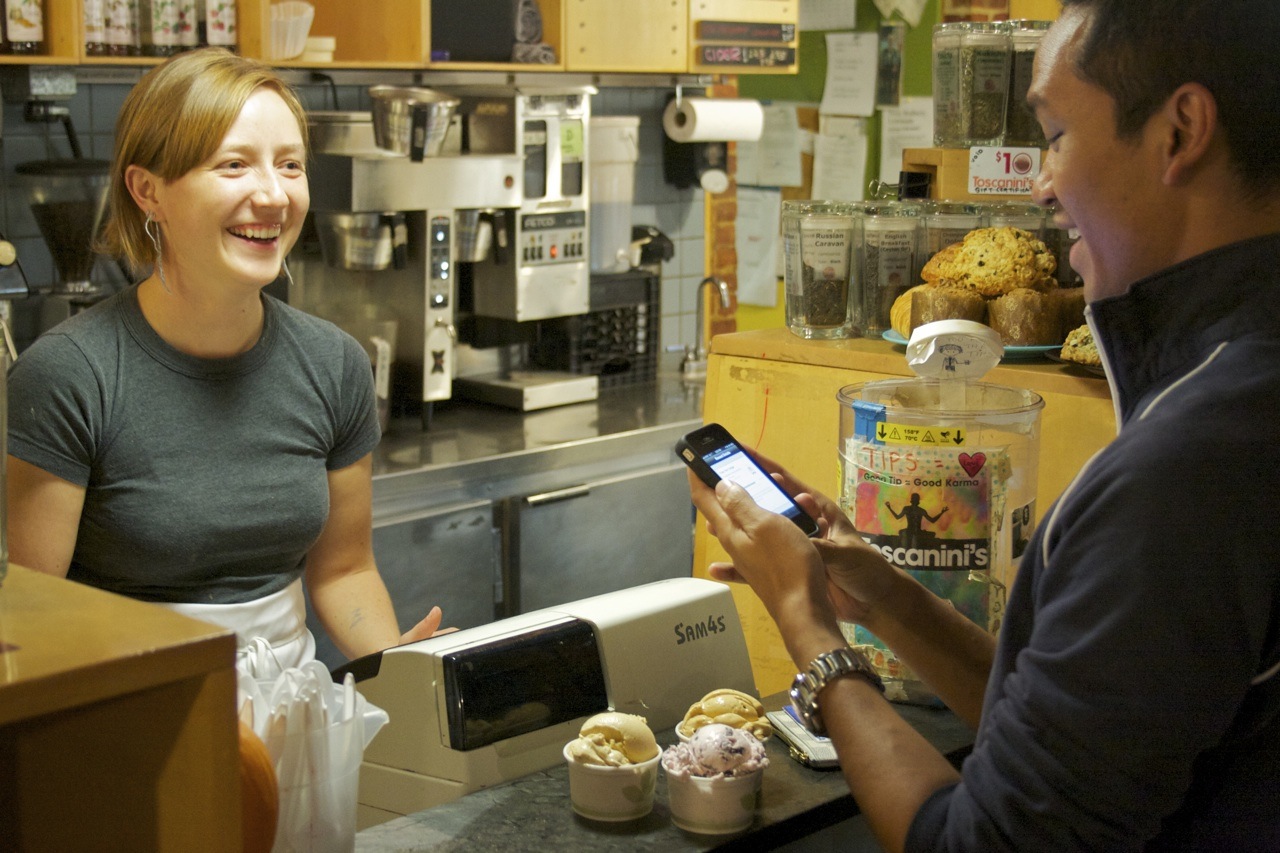
Raise your hand if you like winning. Me too! Sweet. It's no secret that everyone loves winning. But imagine if you could make customers feel like they're winning every time they interact with your business. You'd generate a wealth of positive emotion and a tremendous amount of loyalty, all by simply structuralizing the win.
Thankfully, it's not so far off. The desire to structuralize the act of winning has catalyzed the launch of dozens of startups into the small business space.
The most successful of these startups bring their value to local businesses by bringing "wins" to consumers. Sounds painfully obvious, right? Any good start-up must add value in order to grow its customer base. Duh. But there's a gaping chasm between "good value" and a "win."

(Pictured Above: A SCVNGR user receives a discount at a local ice-cream store.)
So, what constitutes a "win"?
A win occurs when a player (read: consumer) successfully undertakes a non-trivial action to achieve a desired goal. If you're new to game mechanics, don't worry so much about the definitions of these terms. You'll find that it's quite easy to identify situations that are capable of producing wins versus those that are not.
Consider a common method for bringing value to consumers: coupons. A customer walks into your business and you hand them a coupon for a 15 percent discount on whatever they purchase today. The coupon will probably generate additional sales and is definitely a good value for the consumer, but it's decidedly not a win. Why? Because the consumer took no action to achieve the value.
What about Groupon? They seem to be doing quite well. Groupon is so successful because of the elegance with which they've structuralized the act of winning. Groupon creates a goal that many consumers desire: a daily deal at a local business. But-- and this is important-- there's risk! The consumer must take some action to attain the deal. The buyer, along with a set amount of other people, must purchase the deal within a certain time frame to ensure that the deal's tipping point is triggered. Because there is risk that the deal won't occur, the consumer feels that he or she is doing their part to achieve the goal and realize the "win." Yes, Groupon provides great value to consumers, but more importantly, they provide consumers the opportunity to win!
The act of structuralizing winning is neither new nor confined to the local business space. Take eBay, for example. eBay is an efficient online tool that allows you to buy or sell almost any item you can imagine. But that's not what catapulted the company to a multi-billion dollar market cap. eBay didn't just provide an efficient marketplace, they provided a structure in which millions of consumers could win on a daily basis. Think about it: what made you so excited to buy on eBay -- spending hours monitoring an auction to save 10 dollars on a new stereo system? Or was it the rush you got when you beat out "souljaboi32" to capture that deal?
More and more tools are coming online to enable small businesses to structuralize wins into everyday interactions with consumers. There's a host of location-based startups that enable consumers to unlock rewards by checking-in or playing at a specific business. ShopKick works with large retailers to enable consumers to win coupons and discounts by opening an app inside their locations. SCVNGR, my startup, is creating a game layer on top of the world so that players can go places, check-in, do challenges and earn points towards unlocking (winning) rewards like free coffee or 10 percent off a meal. GroupTabs, a relatively new entrant to the space, is seeking to combine group-buying with location-based check-ins so that if enough people go to the same location at the same time, a mini-group deal is unlocked.
While every service has its own unique value proposition, the consistent theme is that players (consumers) take some non-trivial action to achieve a goal. This action element is critical. When a consumer is handed a coupon, they'll naturally assign it a value exactly equal to its financial consequence. However, when they unlock that same coupon, there's an emotional impact that creates value worth many multiples of the actual financial impact. An unearned $1 coupon produces $1 of value. A $1 "win," on the other hand, might produce up to $10 or $20 dollars of value for the consumer. That additional value is translated into increased happiness, loyalty and engagement with your business.
This multiplicative effect is not simply a binary relationship. It's a sliding scale. The more action the consumer has to take to unlock the reward, the greater the multiplier of value that you'll see. But of course, the greater the action required, the fewer consumers that will choose to take it. It's a fine balance, but somewhere in the middle lies a magical region of incredible value production for your business. And that's why it's an art as much as a science to structuralize the win.
Startups, like SCVNGR and many others, are hard at work finding new ways to make structuralizing the win easier than ever to drive traffic, strengthen engagement and increase sales for your business. And now is the time to experiment! It's a new social economy and the guiding principle is this: when you make others feel like they've won, you win!